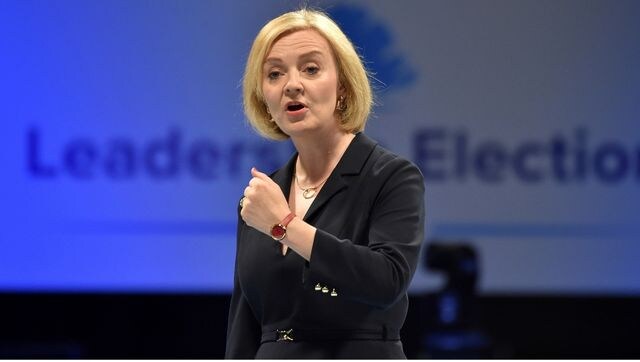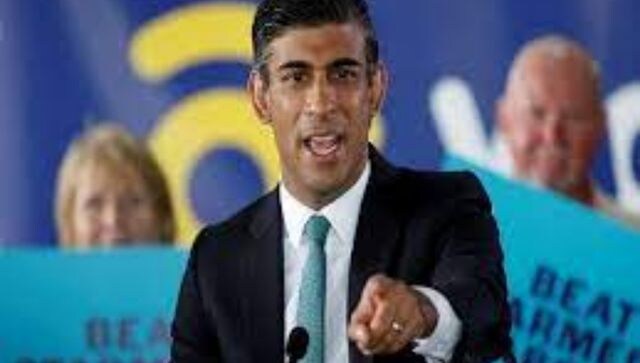‘New Iron Lady’: Who is Liz Truss, Britain’s next prime minister?
Britain’s foreign secretary Liz Truss defeated Rishi Sunak to succeed Boris Johnson as the next UK prime minister. The 47-year-old will be the country’s third woman premier after Theresa May and Margaret Thatcher

Liz Truss arrives at Conservative Central Office in Westminster after winning the Conservative Party leadership contest in London. She will become Britain's new prime minister after an audience with Britain's Queen Elizabeth II on Tuesday. AP
Liz Truss will be the new prime minister of the United Kingdom after defeating Rishi Sunak in the Conservative Party leadership contest.
She beat her rival and former finance minister by 81,326 votes to 60,399 after a leadership bid that was triggered by Boris Johnson’s resignation in July.
“I am honoured to be elected Leader of the Conservative Party. Thank you for putting your trust in me to lead and deliver for our great country,” she tweeted after her win.
I am honoured to be elected Leader of the Conservative Party.
Thank you for putting your trust in me to lead and deliver for our great country.
I will take bold action to get all of us through these tough times, grow our economy, and unleash the United Kingdom’s potential. pic.twitter.com/xCGGTJzjqb
— Liz Truss (@trussliz) September 5, 2022
The 47-year-old will be only the UK’s third woman prime minister after Theresa May and Margaret Thatcher.
Also read: UK gets new PM: Why Rishi Sunak lost to Liz Truss
The rise of Liz Truss
Born in Oxford, Truss spent her childhood in Scotland’s Paisley and then Leeds in north England. She went to Oxford University, where she studied philosophy, politics, and economics. Active in student politics, she was first a supporter of the Liberal Democrats before switching to the Conservative Party and now calls herself a Tory loyalist.
"We Liberal Democrats believe in opportunity for all"
Liz Truss - then in her teens - tells the 1994 Lib Dem conference about being filmed by #Newsnight campaigning against the monarchy pic.twitter.com/5TNfI8lUDX
— BBC Newsnight (@BBCNewsnight) July 20, 2022
She worked as an accountant first but politics was her calling. After failing to make a mark in the 2001 and 2005 general elections, she was elected as a councillor in south-east London’s Greenwich in 2006. She worked as the deputy director of the right-of-centre Reform think tank, reports BBC.
After almost a decade of trying to make it to Westminister, she was elected a member of Parliament (MP) from South West Norfolk in 2010. Her rise after that has been meteoric. Two years on, she entered government as an education minister and was promoted by then PM David Cameron to environment secretary in 2014.
She was appointed justice secretary under Theresa May in 2016 and then went on to become chief secretary to the treasury, playing a crucial part in the government’s economic programme.
When Boris Johnson took over in 2019, Truss was appointed international trade secretary and last year, was elevated to the position of foreign secretary.
Changing stance on Brexit
During the 2016 referendum, Truss first was on Team Remain. In an article published in the British tabloid The Sun, she said that leaving the European Union would be “a triple tragedy – more rules, more forms and more delays” when selling to the bloc.
But she later changed her mind and spoke in favour of Brexit, saying that it would provide an opportunity to “shake up the way things work”.
Brexit negotiator and more
Interestingly, Truss was appointed by Johnson as Brexit negotiator, leading talks to resolve problems arising from provisions of the Brexit agreement covering trade with Northern Ireland. She was severely criticised by the European Union when parts of a post-Brexit deal were scrapped.
Truss played a key role in securing the release of Nazanin Zaghari-Ratcliffe and Anoosheh Ashoori from Iran, the two British Iranian nationals who had both been arrested and detained in the west Asian nation.
The foreign secretary rose to more prominence when she travelled to Moscow to meet her Kremlin counterpart Sergei Lavrov earlier this year, hoping to persuade Russia to pull back from the brink of the war with Ukraine. When Russia still invaded Ukraine she took a strong stand, insisting all Russian forces should be driven from the country and slapped several sanctions on the country.
However, she was slammed for backing individuals from the UK who wanted to travel to Ukraine to fight the war.
Embarrassing moments
Politicians are remembered as much for their policies as their faux pas. Truss has no dearth of them.
Her passionate speech about pork markets in 2014 turned her into a viral meme. As environment secretary, she said during a Conservative Party conference, “In December I'll be in Beijing, opening up new pork markets!” Then waiting for applause, she stood there with a self-pleasing grin. It was awkward.
She hit headlines in 2015 after going on a rant on cheese exports. She was mad that British people weren’t eating enough British cheese. “I want to see us eating more British food here in Britain… That. Is. A. Disgrace.”
Will somebody, for the love of god, please tell me if @trussliz ever sorted out the cheese deficit.
(Yes I will keep posting this clip until I get enough likes and retweets) pic.twitter.com/yMuVUNO9Tk
— simon le vans 💙 (@simonlevans) July 15, 2022
The Tory leader put herself in a tight spot during an interview on LBC, when questioned on the party policy on austerity. She laughed over a question on feeling the pinch after all the cuts and then floundered.
“I don’t know why it’s funny. A lot of people have had a terrible time with austerity,” broadcaster Eddie Mair shot back. And all Truss, who was then treasury minister, said it wasn’t a “good question” and she didn’t know what it mean, according to a report in Mirror UK.
The Thatcher influence
Truss played the rule of Thatcher in school and now she might go on to become prime minister for real. She has even forged her image in homage to the Iron Lady; some call her the “new Iron Lady”.

Liz Truss poses in a tank as she visits British troops in Estonia. Image courtesy: Simon Dawson/No 10 Downing Street
She has posed in a British Army tank in Eastern Europe, evoking an image of Thatcher during the Cold War. In a televised leadership debate this week, Britain’s top diplomat sported a pussy-bow blouse eerily similar to one the late prime minister used to wear, reports the Associated Press.
But interestingly, Truss is the daughter of a left-leaning math professor and a nurse. As a child, she went to anti-nuclear and anti-Thatcher protests, where she recalled shouting. “Maggie, Maggie, Maggie — out, out out!”
She reportedly rebelled against her parents to become Conservative.
The leadership bid
Once reduced to a figure of ridicule, Truss became a Tory favourite.
“I am putting myself forward because I can lead, deliver and make the tough decisions. I have a clear vision of where we need to be, and the experience and resolve to get us there,” she said in the Daily Telegraph newspaper, as she announced her leadership bid.
As her campaign faltered during the early voting rounds, she promised tax cuts worth millions of pounds. She said that if she won, she would scrap a planned rise in corporation tax and suspend green energy levies, costing more than £20bn a year, reports Guardian.
Sunak vs Truss
Truss is a Conservative Party loyalist, who stood by Johnson even after a flurry of resignations followed after Sunak stepped down.
Some in the governing party blamed Sunak for triggering the rebellion against Johnson and fear that the former finance minister cannot beat the opposition Labour Party in the next election, reports Reuters.
Truss’ pugnacious approach — along with her promises to slash taxes and boost defence spending — made her the favourite of the party's strongly Euroskeptic right wing.

Liz Truss receives applause from her team near Parliament in London. She is only the third woman to become Britain's PM. AP
Tim Bale, professor of politics at the Queen Mary University of London, had told the Associated Press that the fact that Euroskeptics adore Truss while suspecting Sunak of pro-EU views — despite him backing “leave” in the referendum — shows the importance of image over substance in politics.
“His (Sunak’s) image doesn’t fit that of a Brexiteer whereas hers does,” Bale said in July.
“There's a kind of presumption that if you're a bit of a smoothie chops who moves easily in international circles you must be a remainer and if you're someone who tells it like it is to Johnny Foreigner then you're obviously a (true) Brexiteer.”
Lowest membership vote
While Truss won, it was not the landslide that was being predicted, reports BBC.
After the Conservative Party changed its internal election rules to give members a final say, ahead of the 2001 leadership contest no leader has got less than 60 per cent votes. Truss secured 57 per cent of member votes, compared to Boris Johnson's 66.4 per cent in 2019, David Cameron goy 67.6 per cent in 2005 and Iain Duncan Smith 60.7 per cent in 2001, according to the report.
Nevertheless, she will be Britain's next prime. And has challenges ahead of her, from the country's cost-of-living and energy crisis to its economy on the brink of recession.
It remains to be seen if she lives to her moniker of the new Iron Lady.
With inputs from agencies
Read all the Latest News, Trending News, Cricket News, Bollywood News,
India News and Entertainment News here. Follow us on Facebook, Twitter and Instagram.
also read

Experienced Liz Truss emerges as the clear favourite to succeed Boris Johnson as next UK PM
Truss has doggedly hammered home a direct and consistent message, promising massive tax cuts, and has shied away from criticising Boris Johnson

Rishi Sunak closes campaign on personal note with parents, wife Akshata
Given the sharp contrast between his booming welcome and that of his rival, Foreign Secretary Liz Truss, it was clear that at least for this audience Sunak was the winning candidate in the race to succeed Boris Johnson

Time to unite behind newly appointed PM Liz Truss, says Rishi Sunak after defeat in UK leadership race
Truss polled 81,326 votes, compared to Sunak's 60,399 in an election with a high turnout of 82.6 per cent, with 654 rejected ballots from a total of 172,437 eligible Tory voters